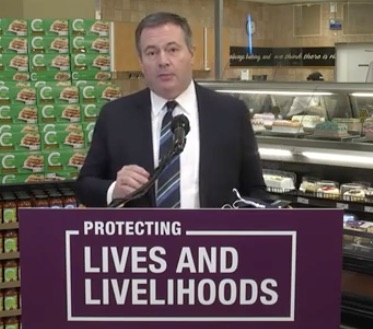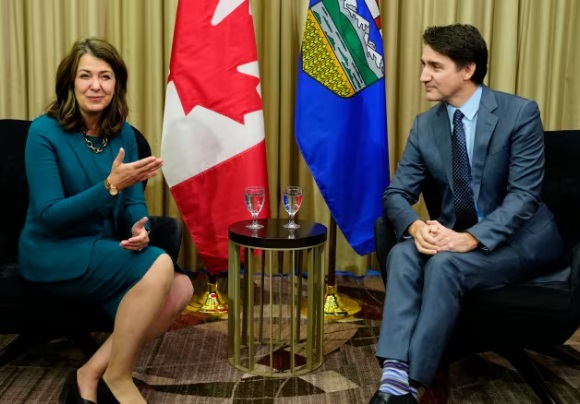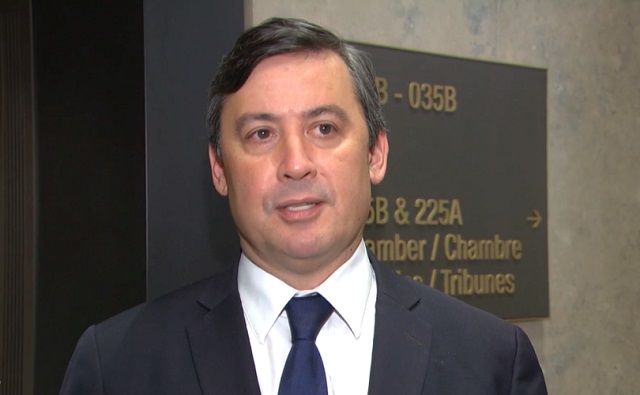Alberta
$1,200.00 boost for “Alberta’s critical workers”

From the Province of Alberta
$465 million for Alberta’s critical workers
Hundreds of thousands of workers who continue to provide critical services to Albertans during the COVID-19 pandemic will receive a one-time payment in recognition of their hard work and sacrifice.
The Critical Worker Benefit is a joint federal-provincial program that will see $465 million go to approximately 380,000 Alberta public and private sector workers as $1,200 cash payments.
“These workers have placed themselves at the front line of this pandemic in order to serve their fellow citizens during a crisis. Alberta’s government is recognizing their good work. We trust this support will help these workers continue to protect lives and livelihoods as we keep fighting this pandemic together.”
The Critical Worker Benefit will be available to workers in the health-care, social services, education and private sectors who deliver critical services to Albertans or support food and medical supply chains.
“I want to thank all the hard-working staff who have gone above and beyond their regular call of duty to support their fellow Albertans throughout this pandemic. This Critical Worker Benefit will go right into the pockets of hard-working Albertans on the front line who have made sacrifices in their own lives for the greater good and well-being of others.”
To be eligible for the benefit, employees must have worked a minimum of 300 hours during the period of Oct. 12, 2020 to Jan. 31, 2021.
“Since the start of this pandemic, we have been deemed an essential service and our store, pharmacy and distribution centre teammates have stepped up to support Albertans and all Canadians. We know that our teammates will be thankful for this recognition and additional support from the Government of Alberta.”
Under the health-care sector, approximately 161,000 eligible employees will receive the Critical Worker Benefit. These eligible occupations include orderlies and patient service associates, respiratory therapists and technologists, nurses (RNs, RPNs, LPNs), food services, housekeeping and maintenance workers and unit clerks.
“I’m proud to see this acknowledgment of our front-line health-care workers. Their continued dedication over the past 11 months caring for patients with COVID-19, but also continuing to provide other important health-care services, has shown tremendous resilience. Their dedication is the strength of our health system and this is just one small way that we can recognize it.”
In the social services sector, approximately 45,000 workers will receive the benefit. Some of the eligible occupations include community disability service workers and practitioners, personal care aides, child development workers, family and youth counsellors, crisis intervention and shelter workers, home support workers, seniors lodge staff, cleaners, food preparation and maintenance workers.
“It has been due to the tremendous efforts of the front-line staff in seniors housing, that our most vulnerable are safe. The precautionary measures workers have taken within their homes and workplaces, where others’ wellness was prioritized over earning potential and personal enjoyments, is why this acknowledgment is so important. This shows appreciation for those our province has had to depend on to keep seniors healthy, happy and safe in licensed supportive living, including lodges, since the onset of the pandemic.”
“Every day, thousands of workers across Alberta support vulnerable people with disabilities and those relying on services provided by shelters. These workers are committed to ensuring people are safe and included in our communities. This benefit acknowledges their extraordinary efforts during the pandemic to provide compassionate and essential care for vulnerable Albertans.”
“Community group care workers and support staff, as well as early childhood educators, have played a critical role in keeping children and youth safe and healthy throughout this pandemic – including staying open or reopening early on to support families. I want to share my sincere gratitude for all their hard work and dedication during these challenging times.”
“Alberta’s seniors lodge workers and unique home operator staff have gone above and beyond to maintain a safe environment for their residents. I am extremely appreciative for the hard work, dedication, and effort of the front-line workers who support seniors and ensure they remain safe during the pandemic.”
Up to 36,000 workers in the education sector will also be eligible to receive the benefit. This includes teacher assistants, bus drivers, custodians and cleaning staff, and administration support.
“Despite the unique challenges that come with learning during a pandemic, students in Alberta continue to receive a world-class education. This is possible thanks to the hard work of thousands of dedicated education workers. This benefit recognizes their determination to go above and beyond for Alberta’s students.”
“Bus drivers across the province have worked tremendously hard to keep students safe while going to and from school. This benefit helps recognize tremendous work done by these essential workers.”
In addition, eligible private sector workers making $25 or less will qualify for the benefit. These workers include: critical retail workers in grocery stores, pharmacies and gas stations; private health provider workers, such as dental assistants, massage therapists and medical administration assistants; food manufacturing and processing workers; truck transportation workers, such as truck drivers and delivery and courier services drivers; and warehouse and storage workers, such as shippers and receivers.
Eligible public sector employees do not need to apply to receive the benefit. Employers will automatically receive the payment through the Government of Alberta to distribute to their eligible employees.
Private sector employers can apply on behalf of eligible employees at alberta.ca/criticalworkerbenefitas of Feb. 17. Employers have until March 19 to apply.
Employers will be responsible for distributing the $1,200 Critical Worker Benefit to their eligible employees.
For detailed information on eligibility and how to apply, please visit alberta.ca/criticalworkerbenefit.
Alberta’s government is responding to the COVID-19 pandemic by protecting lives and livelihoods with precise measures to bend the curve, sustain small businesses and protect Alberta’s health-care system.
Quick facts
- Alberta’s government contributed $118 million toward the $465-million program.
- The breakdown of benefit recipient is:
- Up to $195 million in the health-care sector supporting more than 161,000 workers.
- Up to $55 million toward the social services sector supporting more than 45,000 workers.
- Up to $45 million toward the education sector supporting more than 36,000 workers.
- Up to $170 million toward the private sector supporting more than 140,000 workers.
- Previously allocated:
- $12 million for health-care aides
- $14.4 million for adult congregate care workers
- $3.62 million for children’s congregate care workers
Alberta
Danielle Smith warns arsonists who start wildfires in Alberta that they will be held accountable

From LifeSiteNews
The Alberta government has created an ad campaign highlighting the fact that most fires are caused by humans and not ‘climate change,’ as many left-leaning politicians claim.
In preparation for the so-called wildfire “season,” Alberta Premier Danielle Smith sternly warned anyone caught starting blazes in her province, including arsonists, that they will face charges and be held fully “liable” for all costs associated with the fires.
“As we approach the wildfire season, it is important to understand that 67% of wildfires in Alberta are started by people,” Smith posted Monday on X.
“If you start a wildfire, you can be charged, fined, and held liable for all costs associated with fighting the wildfire.”
Smith made the comments after last year revealing that most of the wildfires in her province (500 of the 650) were caused by humans and not “climate change,” as has been pushed by the legacy media and opposition politicians.
“All I know is in my province we have 650 fires and 500 of them were human caused,” she said, “so we have to make sure that when people know that when it’s dry out there and we get into forest fire season that they’re being a lot more careful because anytime you end up with an ignition that happens it can have devastating consequences.”
To go along with Smith’s Monday message, the Alberta government has also created an ad campaign highlighting the fact that most fires are caused by humans and not “climate change,” as many left-leaning politicians claim.
As reported by LifeSiteNews last year, Smith ordered arson investigators to look into why some of the wildfires that raged across the vast expanse of the province had “no known cause” shortly after they spread.
During the campaign of Alberta’s 2023 election, Smith, whose United Conservative Party won a majority government, had to pause to deal with many wildfires that suddenly, out of nowhere, ravaged the province. The fires came on suddenly and uncharacteristically considering the heavy snowfall in the province in early March and rain in April.
LifeSiteNews reported that despite the arrest of multiple arsonists, Canada’s mainstream media and the federal government have been pushing a narrative attributing the recent wildfires to “climate change.”
Indeed, in January, LifeSiteNews reported that a man from Quebec admitted to starting 14 forest fires himself. This put a chill to the legacy media’s push that the fires in the province were caused by “climate change.”
However, statistics from Canada’s National Fire Database show that wildfires have gone down in recent years and peaked in 1989.
As for Canadian Prime Minister Justin Trudeau, he has repeatedly used “climate change” and forest fires as a catalyst for propping up his government’s much-maligned carbon tax, which Smith opposes. He has blamed the fires on “climate change.”
A June 2017 peer-reviewed study by two scientists and a veteran statistician confirmed that most of the recent global warming data have been “fabricated by climate scientists to make it look more frightening.”
Trudeau has been calling for increased bans on Canada’s natural resources, of which Alberta has in abundance.
Smith has vowed to fight Trudeau on his attacks against Alberta’s oil and gas industry.
The reduction and eventual elimination of so-called “fossil fuels” and a transition to unreliable “green” energy has also been pushed by the World Economic Forum (WEF), the globalist group behind the socialist “Great Reset” agenda in which Trudeau and some of his cabinet are involved.
Alberta
Free Alberta Strategy backing Smith’s Provincial Priorities Act

News release from Free Alberta Strategy
Premier Danielle Smith had a message for Ottawa last week.
Keep out.
On Wednesday, the Premier rolled out her latest weapon in the fight against federal intrusions into provincial jurisdiction.
If passed, Bill 18 – the Provincial Priorities Act – aims to align federal funding with provincial priorities, ensuring that said funding reflects Alberta’s interests.
The legislation stipulates that any agreements between the federal government and any provincial entities – including municipalities – must receive provincial approval to be considered valid.
Smith has already given it a nickname: “the stay-out-of-my-backyard bill.”
It’s an apt description of the legislation, especially considering that’s what the federal government has been doing for years – encroaching into Alberta’s jurisdiction.
The legislation shouldn’t come as a surprise to anyone.
We all know that most deals the Alberta government enters into with the federal government don’t work out for Albertans.
We end up paying more in federal taxes than gets spent in federal spending on the programs.
The programs come laden with restrictive conditions that undermine our autonomy, and are often detrimental to our ability to provide the services.
This is especially true with regard to the recent agreement between Ottawa and the provinces that allows the federal government to nationalize childcare.
The childcare agreement has come under heavy criticism due to funding shortfalls in the deal.
It also applies to housing, where despite Alberta accounting for 12% of the national population and experiencing the most rapid population growth, it received a mere 2.5% of the total $1.5 billion in federal housing funding last summer.
Jason Nixon, Minister of Seniors, Community and Social Services, is in charge of housing in Alberta – which is provincial jurisdiction.
On the latest rollout of conditional federal housing handouts, Nixon isn’t buying.
“We will not be bribed, with our own money, to increase the time it takes to get homes built with green energy that makes homes more expensive.”
The theory also applies to the federal government’s latest gambit – doing an end-around provincial negotiations and going directly to municipalities, who seem more interested in taking the money than the conditions attached.
Municipalities are provincial jurisdiction.
Bill 18 mandates that entities within Alberta’s jurisdiction, such as municipalities, universities, school boards, housing agencies, and health authorities, must seek the province’s approval before engaging in, modifying, extending, or renewing agreements with Ottawa.
Agreements between the federal government and provincial entities lacking Alberta’s endorsement will be deemed illegal under this legislation.
That’s Premier Smith’s message.
She’s had enough of it.
“It is not unreasonable for Alberta to demand fairness from Ottawa. They have shown time and again that they will put ideology before practicality, which hurts Alberta families and our economy. We are not going to apologize for continuing to stand up for Albertans so we get the best deal possible.
“Since Ottawa refuses to acknowledge the negative impacts of its overreach, even after losing battles at the Federal and Supreme Courts, we are putting in additional measures to protect our provincial jurisdiction to ensure our province receives our fair share of federal tax dollars and that those dollars are spent on the priorities of Albertans.”
Municipal Affairs Minister Ric McIver had additional thoughts:
“For years, the federal government has been imposing its agenda on Alberta taxpayers through direct funding agreements with cities and other provincial organizations. Not only does Alberta not receive its per capita share of federal taxpayer dollars, the money we do receive is often directed towards initiatives that don’t align with Albertan’s priorities.
“Albertans from all corners of the province expect our federal share of taxes for roads, infrastructure, housing and other priorities – not federal government political pet projects and programs in select communities.”
The Provincial Priorities Act is based on existing provincial legislation in Quebec – called “An Act Respecting the Ministère du Conseil executif” – which prohibits any municipal body from entering into or negotiating an agreement with the federal government or its agencies without express authorization from the Quebec government.
That’s right – the Quebec government has the same rule!
So, this boils down to the same argument we’ve been making for years – if Ottawa wants to step into our backyard, it must first seek Alberta’s approval.
Enough is enough – we won’t stand idly by as our interests are trampled upon.
It’s time for Ottawa to recognize Alberta’s autonomy and respect our right to determine our own future.
At the Free Alberta Strategy, we know that constant vigilance is necessary – for every fence we put up, the federal government tries to find a way around it.
We’ll continue to bring you information about what’s happening in Alberta’s backyard and fighting to keep Ottawa out.
The Free Alberta Strategy Team
-

 Jordan Peterson2 days ago
Jordan Peterson2 days agoJordan Peterson slams CBC for only interviewing pro-LGBT doctors about UK report on child ‘sex changes’
-

 Addictions2 days ago
Addictions2 days agoLiberal MP blasts Trudeau-backed ‘safe supply’ drug programs, linking them to ‘chaos’ in cities
-

 International2 days ago
International2 days agoBrussels NatCon conference will continue freely after court overturns police barricade
-

 International15 hours ago
International15 hours agoTelegram founder tells Tucker Carlson that US intel agents tried to spy on user messages
-

 Agriculture1 day ago
Agriculture1 day agoBill C-282, now in the Senate, risks holding back other economic sectors and further burdening consumers
-

 Alberta1 day ago
Alberta1 day agoDanielle Smith warns arsonists who start wildfires in Alberta that they will be held accountable
-

 Bruce Dowbiggin14 hours ago
Bruce Dowbiggin14 hours agoWhy Are Canadian Mayors So Far Left And Out Of Touch?
-

 Business11 hours ago
Business11 hours agoCanada’s economy has stagnated despite Ottawa’s spin







